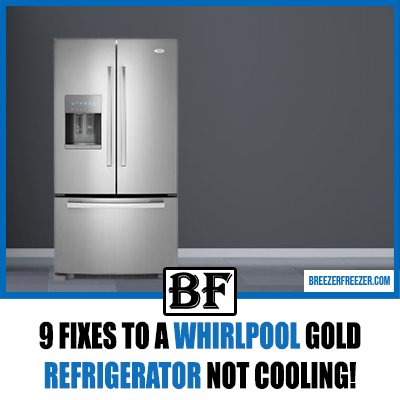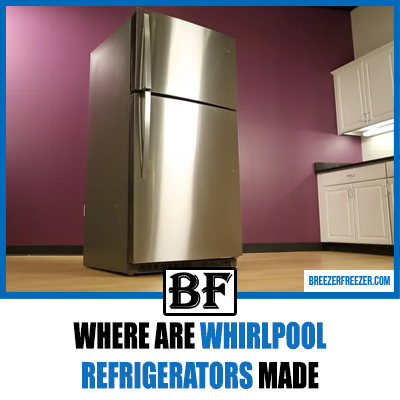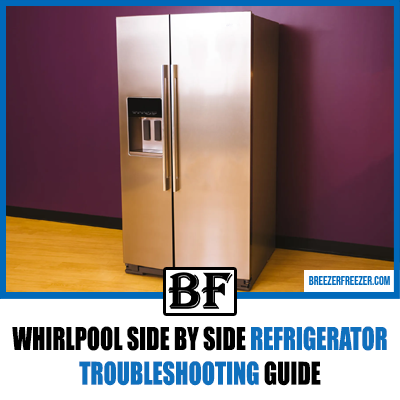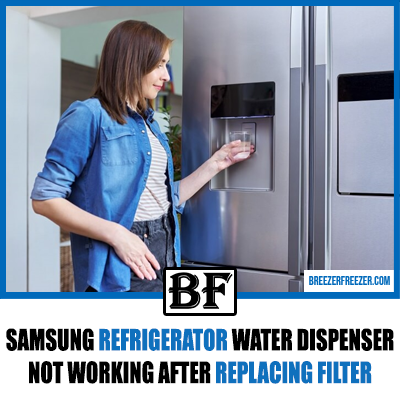Refrigerator Stopped Running No Sound (5 Issues Fixed!)
If your refrigerator suddenly stops running and remains completely silent, there are several possible reasons for this occurrence.

The refrigerator may have been affected by a power disruption, experienced an electrical glitch, entered defrost mode, encountered refrigerant leakage, or suffered from a defective component such as the compressor, fan, or electronic control board.
Out of these five potential issues, only some indicate a severe problem, while others can be easily resolved. This guide aims to address the reasons behind a refrigerator’s sudden failure to run and produce any sound.
Additionally, we will explore what to check when the refrigerator fails to work or illuminate, as well as situations where it remains silent and does not emit any light.
Let’s delve into the details to understand why your refrigerator has stopped running and identify potential solutions to the problem.
Quick Troubleshooting Guide
| Likely Cause | Recommended Solution |
| 1. Disruption in Power Supply (due to power outage, loose plug, tripped breaker, or faulty outlet) | Check for power outages, ensure the power cord is plugged in securely, reset any tripped breakers, and replace any faulty outlets |
| 2. Electrical Anomaly | Reset the refrigerator |
| 3. Refrigerator in Defrost Mode | Adjust the settings |
| 4. Leakage of Refrigerant | Contact a refrigerator specialist |
| 5. Malfunctioning Component | Replace the defective compressor, condenser fan, or electronic control board |
5 Reasons Your Refrigerator Stopped Running No Sound
If your refrigerator suddenly stops running and makes no sound, consider these five possible issues:
Power Disruption
Your refrigerator may stop running if there is an abrupt power disruption. This can be caused by a power outage, a loose plug, a tripped breaker, or a defective outlet. These power supply issues can result in the refrigerator going silent.
Fix: Check if you have power by waiting for the power to resume after an outage. Ensure the refrigerator power cord is securely plugged into the socket and reset the power breaker if necessary. If the outlet is faulty, replace it. You can also test the outlet by plugging in another appliance.
Electrical Glitch
Sometimes, electronic devices like refrigerators experience temporary electrical glitches that interrupt their operation. In most cases, a hard reset can restore normal functioning.
Fix: Perform a hard reset on your refrigerator by unplugging it from the socket, setting the refrigerator and freezer controls to zero, waiting for at least an hour, and then reconnecting the refrigerator. Adjust the temperature controls to your desired settings and allow the refrigerator 24 hours to stabilize before checking if it is working.
Defrost Mode
If your refrigerator is stuck in the defrost cycle, it may stop running and go silent. You can determine if this is the case by checking the internal temperature.
Fix: Verify if the refrigerator is set to Defrost Mode and adjust the setting according to the instructions in the fridge manual.
Refrigerant Leakage
Refrigerators may fail to run properly or stop running altogether when there is a refrigerant leakage or a drop in refrigerant levels. The refrigerant, responsible for absorbing heat and creating a cold environment, is crucial for refrigeration and freezing.
Fix: Consult a refrigerator expert to diagnose and repair any refrigerant leakage or related issues.
Defective Component
A faulty component can cause your refrigerator to stop running and become silent. Three components that may fail and result in this issue are:
- Compressor: A properly functioning compressor emits a faint humming or low buzzing sound when the fridge is running. If the compressor becomes unusually silent, it may be defective. Other signs of a faulty compressor include short cycling, overheating, and abnormally loud humming (which may not be applicable in this case). Compressor failure can occur due to fridge overload, dirty or iced-up coils, low refrigerant levels, or natural wear over time (typically after 15 years).
Fix: Look for signs of a defective compressor and consider replacing it if necessary. If unsure, seek assistance from a refrigerator expert. Before replacing the compressor, try rebooting it by unplugging the refrigerator, setting the controls to zero, plugging it back in, setting the correct temperature (40°F), and allowing 24 hours for stabilization.
- Condenser Fan: The condenser fan is another component that should not run silently. If the fan is not running, it could be the reason for sudden silence in the fridge. Note that the compressor may still be working even if the condenser fan fails. However, over time, compressor overload can occur if the fan does not function properly.
Fix: Replace the condenser fan if it is not running.
- Electronic Control Board (ECB): The electronic control board powers all other components in the refrigerator, so if it fails, the refrigerator will stop running. A short-circuited ECB may be unable to relay information to the rest of the fridge.
Fix: A defective electronic control board needs to be replaced. Since diagnosing the ECB can be challenging, it is advisable to seek assistance from an expert. Considering the cost of the control board, it is best to avoid replacing it unless it is confirmed to be faulty.
Refrigerator Stopped Working No Light
If your refrigerator suddenly stops running and fails to light up, the most likely cause is a power issue. It could be due to a power outage, loose plug, tripped circuit breaker, or defective outlet.
If your refrigerator has power, the following issues may be responsible:
- Burnt fridge bulb (damaged filament)
- Defective door switch
- Faulty wiring
- Malfunctioning circuit board
To troubleshoot and resolve the issue, first, check if there is power by ensuring the refrigerator is plugged in securely and resetting any tripped circuit breakers. If the outlet is faulty, it may need to be replaced. If the refrigerator still does not light up, consult a professional to inspect the wiring and condition of the circuit board.
Fridge Not Making Noise But Light On
If your fridge lights up but does not make any noise, rule out a power issue. In this case, the problem is likely a setting issue.
Check if the controls are set to zero, as this may prevent the refrigerator from running. It is also possible that the fridge is in a defrost cycle, which needs to be changed. If neither of these is the problem, it may indicate an overheating compressor that requires replacement.
Refrigerator Stopped Running No Sound No Light
If your refrigerator stops running and does not light up or make any sound, it is likely due to a power failure, wiring fault, or defective electronic control board.
To troubleshoot, start by resetting the refrigerator. Unplug it for at least an hour, then plug it back in and check if it starts running. If it still does not work, it is advisable to contact a professional to inspect the wiring and assess the condition of the electronic control board.
Fridge Not Cooling But Light Is On
Several issues can cause a refrigerator to have its lights on but fail to cool properly. Possible reasons include a power disruption (e.g., a tripped breaker, loose power cord, or malfunctioning socket), incorrect temperature setting (outside the range of 35-40°F), a dirty condenser coil preventing proper heat dissipation, the fridge being in defrost mode instead of cooling, an unlevelled fridge, or defective components such as the door seal, condenser fan, air damper, or compressor.
To address this issue, check if there is a power disruption and ensure the refrigerator is correctly plugged in. Adjust the temperature settings within the recommended range. Clean the condenser coil to improve heat dissipation.
Check the fridge’s operating mode and switch it to cooling if necessary. Make sure the fridge is leveled properly. If the problem persists, consult a professional to diagnose and repair any defective components.
Frequently Asked Questions
What Should I Check First When My Refrigerator Stops Working?
If your refrigerator stops working, the first thing to check is its power supply. Make sure the refrigerator is plugged in securely, the circuit breaker hasn’t tripped, and the fuse isn’t blown. Also, verify if there’s a power outage that might be causing the issue. If the power supply is fine, check the temperature controls to ensure they are set correctly.
What Could Cause My Refrigerator to Suddenly Stop Working?
A sudden stop in your refrigerator’s operation could be due to an interruption in the power supply. This could be caused by a loose power cord, a tripped circuit breaker, a faulty socket, or a power outage.
If the power supply isn’t the issue, the problem could be a short-circuited motor or control board, or a leak in the refrigerant. While a short-circuited motor or control board can be replaced, a refrigerant leak should be addressed by a professional.
Why Isn’t My Refrigerator Running?
There could be several reasons why your refrigerator isn’t running. It might be due to a disruption in the power supply caused by an outage, a tripped circuit breaker, a loose power cord, or a faulty socket. Alternatively, the issue could be a short-circuited main control board.
Closing Thought
Now that you know the possible reasons why your refrigerator stopped running with no sound, start by checking its power supply and performing a reset. Adjust settings if the fridge is in defrost mode and consider replacing any defective components such as the compressor, condenser fan, or electronic control board.
If you are unable to resolve the issue, seek assistance from a professional to inspect the refrigerant and refill it if needed.





